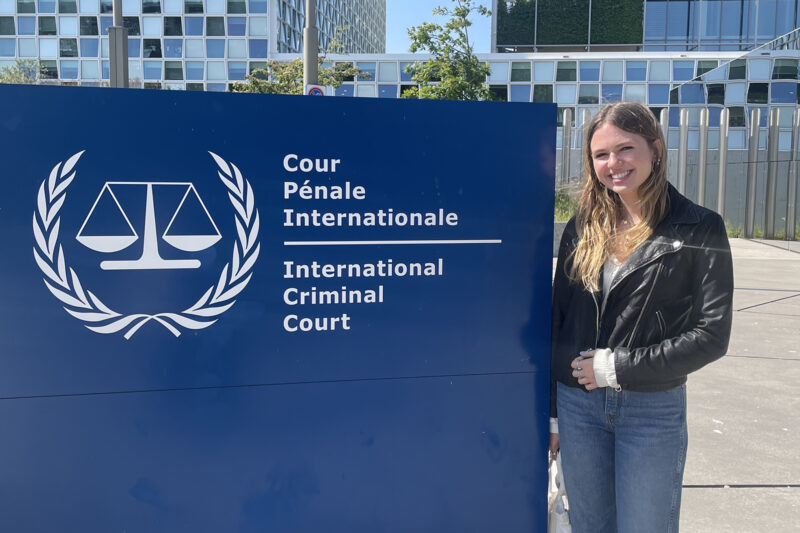Hannah Oblak BA ’24, a student in the Brady-Johnson Program on Grand Strategy, traveled to Europe this summer to learn more about international judicial systems and response mechanisms that address systemic sexual violence. In this blog, she shares her experience and how it shaped her personal and professional goals.
This summer, I traveled to The Hague, Netherlands, and Dubrovnik, Croatia, on a research grant from the Brady-Johnson Program in Grand Strategy. My research was driven by a desire to better understand the international judicial systems and response mechanisms that address sexual violence, and expand upon my prior studies of the International Criminal Tribunal for the former Yugoslavia and the experiences of victims of the Bosnian rape genocide. I hoped to deepen my understanding of the history of the Yugoslav Wars and to explore the successes and failures of both legal and non-judicial pathways to justice for victims of gender-based violence. Not only did I gain a new perspective on my research, but I had an experience that I will never forget.
While in The Hague, I had the chance to visit the International Court of Justice (ICJ), one of the six principal organs of the UN, as well as the International Criminal Court (ICC) and the site of the International Criminal Tribunal for the former Yugoslavia (ICTY). I was lucky enough to sit in on the proceedings of the ICC, a unique opportunity to observe firsthand and better understand the operations of international bodies. By doing so, I gained a new perspective on the historical importance of these tribunals, such as the ICTY and International Criminal Tribunal for Rwanda’s role in introducing rape and sexual violence as prosecutable wartime crimes under international law. I also observed firsthand bureaucratic challenges of international tribunals: With individual cases often calling hundreds of witnesses alone, large-scale justice was also a gradual process, and the number of perpetrators prosecuted never matched the harm done.
I then traveled to Dubrovnik, Croatia, where I had discovered an interest in southeastern European history a year earlier. I spent the summer of 2022 studying in Dubrovnik, thanks to the wonderful programming of the Yale Center for International and Professional Experience. That experience allowed me to study the Bosnian genocide in depth and became impassioned by the lack of justice for survivors of sexual violence. Returning to Dubrovnik, I reconnected with an old professor and visited powerful exhibitions at sites like War Photo Limited, the Cultural History Museum, and the Homeland War Museum. These sites expanded my historical understanding of a city under siege only 30 years ago, while connecting my research to the experience of 21st century conflicts, in particular war crimes committed against women and children in the war in Ukraine.
When I returned home, I continued to conduct interviews and archival research pertaining to my project. I spent the rest of my summer working for MSNBC, in digital and broadcast journalism. Through my ongoing research and work with more current events, I found that the trip had changed my understanding of past conflicts, as well as my perception of current foreign affairs and ongoing human rights crises. I even pitched news stories and segments about the war in Ukraine and its effect on civilians inspired by what I learned during my travels.
I am also immensely grateful for the opportunity to travel and experience new cultures while abroad. During my trip to the Netherlands, I passed through Amsterdam and got to explore its canals and museums, as the city is located only a short train ride from The Hague. And while in the historic Old City of Dubrovnik, I ran into the Yale Slavic Chorus in Luža Square.
Ultimately, my travels benefited both my academic studies at Yale, and my own personal development. The experience reaffirmed my interest in a career in international diplomacy and the non-profit sphere, where I hope to advocate for the rights of women and girls.
